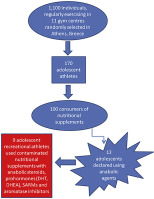Food and Chemical Toxicology ( IF 3.9 ) Pub Date : 2018-04-03 , DOI: 10.1016/j.fct.2018.03.043 Konstantinos Tsarouhas , Nassia Kioukia–Fougia , Petros Papalexis , Aristidis Tsatsakis , Dimitrios Kouretas , Flora Bacopoulou , Christina Tsitsimpikou

|
Although the use of nutritional supplements by adult athletes has been extensively studied, information on supplements consumption by adolescent athletes is still limited. The present study reports on the use of nutritional supplements contaminated with banned doping substances among 170 recreational adolescent athletes from eleven, randomly selected, gym centres, in Athens, Greece. Nutritional supplements consumption was reported by almost 60% of the study population, with proteins/amino acids and vitamins being the most popular. Nine per cent of the users were found to consume nutritional supplements contaminated with anabolic steroids, prohormones, selective androgen receptor modulators (SARMs) and aromatase inhibitors, all pharmacological substances with endocrine modulating properties not stated on the label. None of these individuals had previously consulted a physician or a nutritionist. A representative sample (ca 15%) of the protein/aminoacids and creatine preparations used by the study population were also tested and found free from doping substances. The majority (63%) of adolescents purchased products from the internet. In conclusion, exercising adolescents can have easy access to contaminated nutritional supplements and “black market” products, which could constitute a risk for public health. Low level of awareness and low involvement of medical care professionals among recreational adolescent athletes is also observed.
中文翻译:

休闲娱乐的青少年运动员在希腊雅典使用受禁止的掺杂物质污染的营养补品
尽管已经广泛研究了成年运动员使用营养补品的情况,但有关青少年运动员食用补品的信息仍然有限。本研究报告了在希腊雅典的11个随机选择的体育馆中的170名休闲青少年运动员中使用受禁止的掺杂物质污染的营养补充剂的情况。据报道,近60%的研究人群食用营养补充剂,其中蛋白质/氨基酸和维生素是最受欢迎的。发现有9%的用户食用被同化类固醇,激素激素,选择性雄激素受体调节剂(SARM)和芳香酶抑制剂污染的营养补品,所有这些药物均具有标签上未标明的内分泌调节特性。这些人以前都没有咨询过医生或营养师。还对研究人群使用的蛋白质/氨基酸和肌酸制剂的代表性样品(约15%)进行了测试,发现不含掺杂物质。大多数(63%)的青少年从互联网上购买产品。总之,锻炼青少年可以轻松获得受污染的营养补品和“黑市”产品,这可能构成公共健康风险。还观察到休闲青少年运动员的认识水平较低,医疗保健专业人员的参与度较低。大多数(63%)的青少年从互联网上购买产品。总之,锻炼青少年可以轻松获得受污染的营养补品和“黑市”产品,这可能构成公共健康风险。还观察到休闲青少年运动员的认识水平较低,医疗保健专业人员的参与度较低。大多数(63%)的青少年从互联网上购买产品。总之,锻炼青少年可以轻松获得受污染的营养补品和“黑市”产品,这可能构成公共健康风险。还观察到休闲青少年运动员的认识水平较低,医疗保健专业人员的参与度较低。











































 京公网安备 11010802027423号
京公网安备 11010802027423号